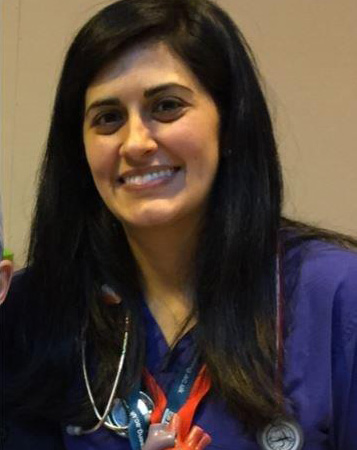
NIHR SRMRC Clinical Fellow presents her experiences of dealing with knife crime in Birmingham


Knife crime is a major public health concern in the United Kingdom. The West Midlands has the fourth highest national rate of crime involving a knife or sharp instrument (111 per 100,000 population), with several urban areas in the Midlands and North of England demonstrating a sharp increase compared with the year 2017/18 (Office of National Statistics). Even in cases where an assault involving a knife has not proved fatal, victims are often left with chronic and debilitating health and psychological issues, with an impact on their families and local community.
NIHR SRMRC Trauma Research Fellow, Ms Nabeela Malik, has been conducting research in to knife crime in the West Midlands, supervised by Lt Col Mark Foster and supported by a team of staff including statisticians, bioinformaticians, data scientists and AI experts, as the Centre takes on an active role in trying to understand the knife injured patient pathway.
Nabeela was recently invited to speak about her research at two prestigious events: The British Orthopaedic Association Annual Congress in Liverpool and at a Royal College of Surgeons conference: Surgeons at the sharp end – Knife crime in the West Midlands. There was a sharing of ideas between the organisations to facilitate a better understanding of the scale and nature of the knife crime epidemic, and how we can work together to tackle this.
After her presentation at the Royal College of Surgeons event, Nabeela gave an interview to Medscape UK about her experiences treating victims of these violent attacks. Ms Malik said she believes that “Calmness, emotional control, compassion and a very thick skin are just some of the essential characteristics required for surgeons who treat trauma and knife crime.” She continued that she feels especially sad to see this issue happen so close to home – “Birmingham is a city that I’ve lived in and grown to love and knife crime is certainly a problem here. I have struggled with the fact that so many young people are losing function or losing their lives as a result of knife crime…” but expressed how “pleased” she is “that (she) has the opportunity to do work to try to counter this problem.”
The research highlighted that of those arriving in hospital, 98.2% survive to discharge. These impressive figures not only highlight the improvements from trauma regionalisation but are a direct result of the clinicians at University Hospitals Birmingham NHS Trust, particularly those in the Emergency Department and the Major Trauma Service lead by Mr Alastair Marsh for providing excellent care to the victims of knife crime.





